Femia > Health Library > Pregnancy > Giving birth > Feeling your baby’s first moves: What is quickening in pregnancy
Feeling your baby’s first moves: What is quickening in pregnancy
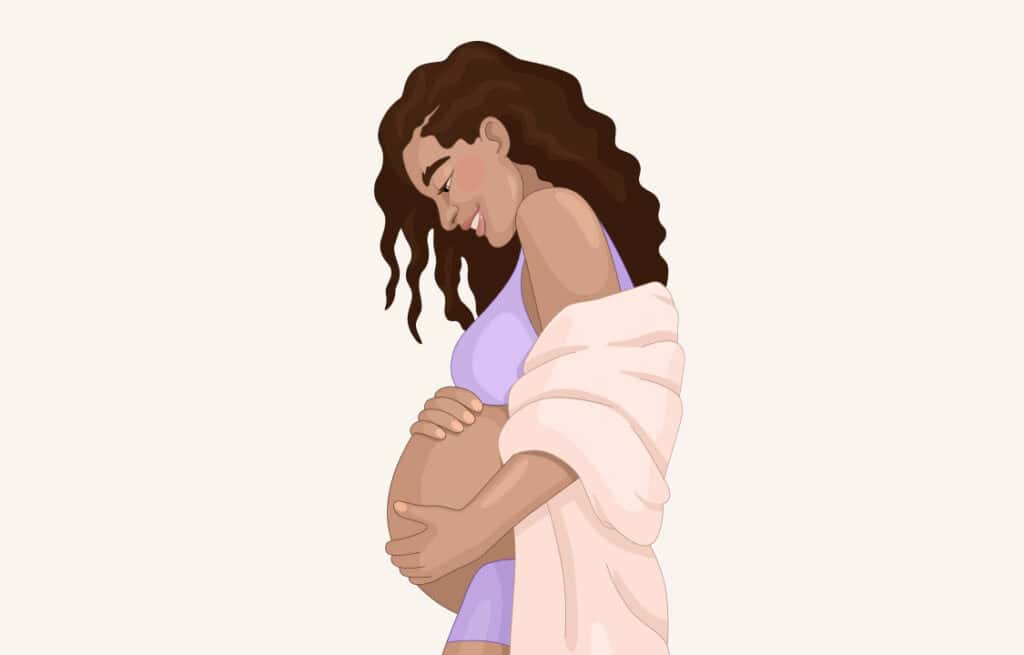
- Updated Mar 2, 2025
- Published
CRAFTED BY HUMAN
Crafted by human At Femia, we provide accurate and up-to-date information at every stage of your journey, from trying to conceive, pregnancy and postnatal support. All content is created by a real person based on in-depth research and own professional experience. Femia ensures that you will receive expert advice, strict accuracy and a personalized approach from our authors/medical experts. Learn more about our editorial policy.
FACT CHECKED
Fact checked At Femia Health, we maintain the highest standards of editorial excellence in delivering content focused on helping you conceive, guiding you through pregnancy, and supporting you postpartum. Explore our content review principles to learn how we ensure the accuracy and quality of our health and lifestyle tips for every stage of your journey.
Quickening in pregnancy is the small fluttering, bubble-popping, or pulse-like movement of your baby that you start to feel around your 13 to 25th week of pregnancy. The timing can vary depending on whether it’s your first pregnancy or not. As your pregnancy progresses and you reach your third trimester, these tiny movements turn into pronounced kicks and small punches.
If you are pregnant, quickening may be the most exciting and awaited thing to experience. But, what is the quickening? Or, what is quickening in pregnancy?
Quickening is the first time you feel your baby’s tiny movements during pregnancy. This phase increases your emotional and physical bond with your baby. In addition, it boosts your anticipation that the baby is growing and the moment you will get to hold them is near.
So, when should you expect to experience quickening? If you haven’t started feeling quickening or can’t figure out if the movement is quickening or something else, we’ve got you covered.
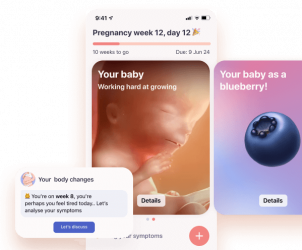
Quickening in pregnancy explained
What is quickening?
Quickening is defined as the very first soft and subtle movements of the baby felt in the mother’s womb.
It is one of the most important events in your pregnancy, both medically and emotionally. Quickening is an assurance that your baby is healthy and their growth is progressing. With that, it also deepens your emotional connection to the unborn baby.
Moreover, quickening helps the doctor identify your baby’s health, approximate gestational age, and growth. It also allows you to keep track of the number of movements.
This way, you can identify any changes in your baby’s quickening patterns and consult your doctor in case of any unusual happenings.
When to expect quickening?
Quickening movement starts to develop at around the fourth or fifth month of pregnancy.
Some moms may feel the quickening sounds and movement earlier than the fourth month, while some may experience it later in the third trimester, which is completely normal. The timing can vary depending on the baby’s physiology and your bodily changes.
Pregnant women who are expecting for the second time may be more likely to feel first movements a bit earlier than they might for first pregnancies, around month 4. But for the most part, women aren’t aware of the flits and twitches (which can feel a lot like gas or muscle spasms) until the start of month 5.
So, you can expect quickening anytime before or after your fourth month of pregnancy. Healthcare providers recommend monitoring quickening movement from your third trimester (sixth to ninth month of pregnancy) regardless of whether it’s your first or second pregnancy.
So, if you aren’t feeling any quickening movements in the fourth or fifth month and your doctor says that your baby is healthy, it is normal and nothing to worry about.
👉Find out more: Understanding lactation: Signs your milk is coming in during pregnancy
What does quickening feel like?
Quickening may be a different experience for every mom. Some moms describe quickening as a soft, pulse-like movement, while some define it as small bubbles popping in their tummy. Others say that it feels like rolling sensations.
In addition, some mothers also say that the flutters in their pregnancy felt like small butterflies announcing the arrival of joy. Others express that the gentle movements of quickening makes their world suddenly feel brighter.
Overall, moms describe their quickening like:
- Tiny kicks
- Popping bubbles
- Flutter of butterfly wings
- Small pulses
- Tapping movement
- Small muscle spasms
This shows that the quickening may vary and feel different in every pregnant woman. It is also possible that you may feel quickening as some other sensation apart from these, which is normal, too.
Quickening is generally sensed in the lower stomach, below your belly button or close to your pubic bone.
👉Find out more: Late decelerations during labor: What you need to know
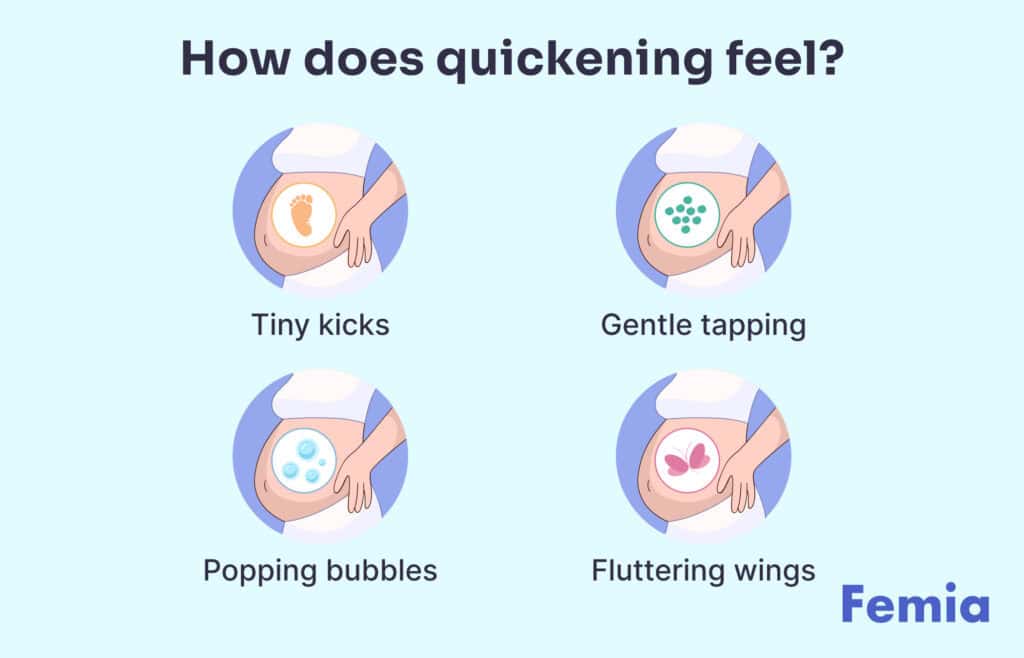
When and how often will I feel quickening?
You should start feeling the quickening during or after the fourth month in your pregnancy.
At first, the quickening may be irregular, but as your pregnancy progresses and you reach your third trimester, the movements or kicking sounds will be more prominent and frequent, happening several times a day.
By the third trimester (around 28 weeks), you should feel at least 10 movements within a two-hour period. If you notice fewer movements, contact your doctor for further information!

Is what I'm feeling quickening? How to recognize quickening?
Sometimes, it may be difficult for first-time pregnant moms to recognize and differentiate quickening from other body movements, especially bowel movements.
Pregnancy is a unique experience for every body, so the movements in each woman can vary and happen at different times and intervals.
Some important tips to differentiate quickening from other bodily movements are:
- Quickening usually starts after the sixteenth week of pregnancy. So, if you experience any sensations or sounds before this time or in the initial months of your pregnancy, it may be due to digestive movements, like gas.
- Other bodily movements may be rhythmic and louder, while quickening is gentle, tiny, and soft movements that resemble popping bubbles or tapping sounds.
- Once your quickening starts, you will feel a specific pattern and timing in the movements. For example, they may increase after meals or when you rest. And, with time, the movements will become more frequent and pronounced. On the other hand, other bodily movements may not be as regular and patterned.
- You can also go for an ultrasound or consult your gynaecologist to confirm if your baby’s movement has started.
👉Find out more: How to spot the difference between single and twin pregnancy symptoms

How do I monitor quickening? Do I need to do it?
Monitoring quickening is not just a good approach, but it is also essential for tracking and consistently recording your baby’s movements. This practice is an important part of fetal monitoring. It lets you identify the normal movements of your baby, and you can differentiate and sense it when you feel something unusual.
The movements generally begin after the sixteenth week of pregnancy, so you can start to monitor for them as you reach your fourth month. However, the start of quickening can vary in each pregnancy. If you think you’ve noticed it happening before the sixteenth week, you can check with your doctor to confirm.
Once you have confirmed with your doctor and started monitoring the quickening, marking the number of movements in a calendar can help you remember and maintain a record. Using a pregnancy app can simplify the process by allowing you to log and track your baby’s movements.
As your pregnancy moves forward, particularly from the third trimester, you will experience more frequent and obvious movements, so sensing and keeping track of the quickening will be easier.
So, from your seventh month, you should monitor the movements every day to identify what’s normal for your baby.
👉Find out more: Signs of ovulation after giving birth: What new moms need to know
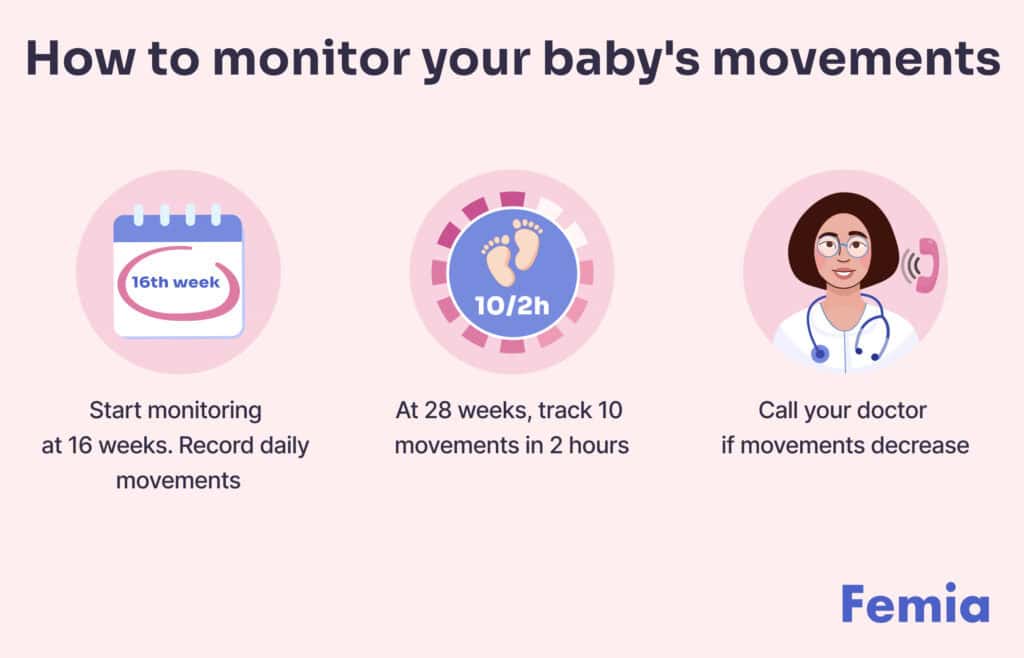
What do I do if I don't feel my baby moving?
Some women won’t notice quickening until in or after the fifth month of pregnancy. However, if you haven’t felt any quickening or kicking by the twenty-fifth week, consult your healthcare provider so they can ensure your baby’s health.
On the other hand, if you have been monitoring your quickening and notice a considerable reduction in your baby’s movement or no movement at all compared to before, it is best to contact your healthcare provider.
Normally, there should be ten movements or more in two hours, and if you don’t notice it, it is advised first to rest and count again later on the same day. If you still don’t sense ten quickening or small kicks within two hours, healthcare providers recommend visiting your OBGYN or doctor for an examination.
Questions from the Femia community
Do quickening sensations vary between pregnancies?
Yes, you may notice different movements and timings with each pregnancy, which is normal. Every baby and its growth is unique, so you may feel the quickening differently based on your bodily changes and your baby's growth.
If it's your first pregnancy, you may feel quickening sensations in the late second trimester, while in the next pregnancies, the sensations may be felt earlier. The opposite can happen, too.
Moreover, the type of movements can differ. It might be possible that you felt flickering in your first pregnancy, and in your second or third pregnancy, the sensation is more like light kicks. All of these occurrences are normal as long as your baby is healthy.
Does the time of day affect when I feel quickening?
Yes, the time of the day can also affect your quickening—some moms-to-be experience quickening at night, while some feel it after meals or when they are moving.
There will be certain times you will feel more movement from your baby, and other times you will feel less to no movement. It is important to keep a record of when and how many movements you experience in a day.
How can I get my baby to move more?
Your healthcare provider can best advise you how to increase your baby's movement based on your overall health condition and pregnancy month.
Generally, if your blood sugar is normal, you can have a healthy snack or drink something with natural moderate sugar to improve your baby's movement.
In addition, gently touching your belly, mild physical activity, and changing positions can also help increase your baby's movement.
When should I consult my doctor?
It is recommended to consult your doctor if you experience any of the following quickening issues:
1) If you notice less movements of your baby than usual.
2) If you don't feel any movement.
3) If you notice any unusual change in the movement patterns of your baby.
4) If you feel less than ten movements in two hours after your 25th pregnancy week.As quickening time can vary in each pregnancy, it is best to start monitoring your movements and consult your doctor for any quickening concerns after the doctor has confirmed that your baby's movement has started.
The bottom line
Quickening in pregnancy is the most precious, joyful, and emotional experience for moms.
With that, it is important to note that every pregnancy and baby is different, so you may experience a unique journey with different movements compared to your previous pregnancy or other pregnant moms.
Hence, keep yourself relaxed, avoid overthinking, and enjoy your special time. If you have any concerns or notice something unusual, we advise you to contact your healthcare provider.
References
- Huecker, Braidi R., et al. “Fetal Movement.” StatPearls – NCBI Bookshelf, 5 Feb. 2023, www.ncbi.nlm.nih.gov/books/NBK470566.
- Website, Nhs. “Your Baby’s Movements.” nhs.uk, 16 Sept. 2022, www.nhs.uk/pregnancy/keeping-well/your-babys-movements.
- “Reduced Fetal Movements – Newcastle Hospitals NHS Foundation Trust.” Newcastle Hospitals NHS Foundation Trust, 29 Jan. 2021, www.newcastle-hospitals.nhs.uk/services/maternity/during-pregnancy/maternity-assessment-unit/reduced-fetal-movements/#:~:text=It%20is%20important%20to%20contact,baby%20move%20by%2024%20weeks.
- americanpregnancy.org/healthy-pregnancy/while-pregnant/counting-baby-kicks/
- Professional, Cleveland Clinic Medical. “Quickening in Pregnancy.” Cleveland Clinic, my.clevelandclinic.org/health/symptoms/22829-quickening-in-pregnancy
- my.clevelandclinic.org/health/articles/23497-kick-counts
- American Pregnancy Association. “First Fetal Movement: Quickening in Pregnancy.” American Pregnancy Association, 7 Dec. 2023, americanpregnancy.org/healthy-pregnancy/pregnancy-health-wellness/first-fetal-movement

A PCOS diet can be used to manage the symptoms of polycystic ovaries syndrome. A PCOS diet is rich in fresh fruits and vegetables, lean protein, whole grains, and healthy fats.
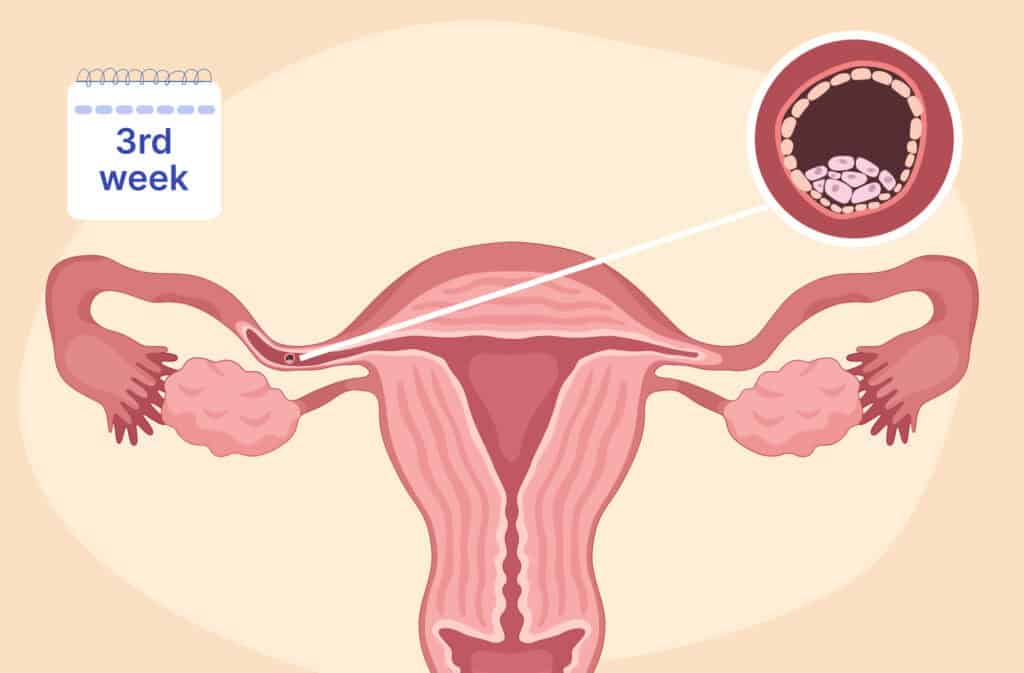
At 3 weeks pregnant, your body begins showing early pregnancy signs. Explore 3-week symptoms, fetal growth, and tips for this early stage.

Discover the best age to get pregnant with PCOS and how to get pregnant with PCOS. Read expert tips on managing PCOS, and improving fertility naturally and with treatments.

